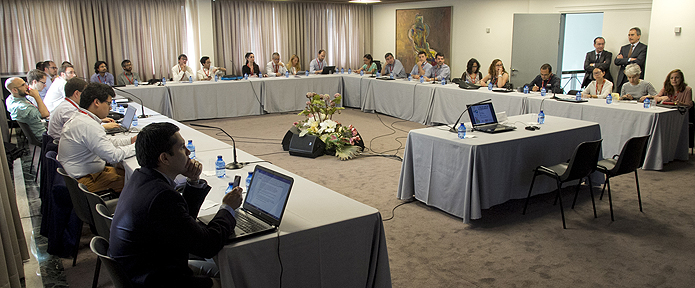Women and politics, the use of cell phones for finance, and corruption and trust in institutions, some of the topics of the first workshop of the V NCID Research Workshop.
It was organized by the Navarra Center for International Development and the Ramón Areces Foundation.

The first workshop of the V NCID Research Workshop, organized by the Navarra Center for International Development of the University of Navarra and the Ramón Areces Foundation, focused on the political Economics of development. Research was presented on topics such as women and politics, the use of cell phones for finance and corruption, and trust in institutions in developing countries development.
First, Sonia Bhalotra, Professor of Economics at the University of Essex (United Kingdom), spoke at discussion paper 'Women in politics, participation and preferences in public policy'. She presented a research that examines whether women's political representation in legislatures improves the public provision of prenatal and child health services in districts where they are elected. The study, using large representative samples from data in India, concludes that a 10 percentage point increase in female representation results in a 2.1 percentage point reduction in neonatal mortality.
This was followed by Pedro Vicente, from the Universidade Nova de Lisboa and Novafrica. He spoke from a research on the introduction of the use of money through cell phones in rural Mozambique (mobile money). The limitations of access to finance in Africa, together with the recent expansion of the use of cell phones on the continent, have created high expectations for the introduction of this service subject in many African countries. Professor Vicente's team developed a field experiment that has demonstrated a trend for mobile money to replace traditional savings and remittance alternatives.
Irma Clots-Figueras, researcher at Universidad Carlos III de Madrid, was the third speaker of the workshop. She presented a research on trust in institutions and the population's demand for them. The work analyzes this relationship with experimental data : experiments were carried out in which people joined different groups depending on their level of trustworthiness and could choose the level of institutions they preferred.
In the afternoon, the first speaker was Joseph F. Gomes, researcher of the Navarra Center for International Development at the University of Navarra. He shared the results of a research in which he examined maternal mortality ratios (MMR) and the gap between the life expectancy of women and men. According to agreement , areas that are more gender-biased have higher levels of maternal mortality, lower rates of maternal mortality decline and less favorable life expectancy differentials for women. It also reveals that societies with higher levels of gender inequality are less likely to pursue women-specific health outcomes.
Selim Gulesci, from Bocconi University, then offered the discussion paper 'For the love of the Republic. Education Secularism and Empowerment'. He explained a work whose starting point was a new law implemented in 1998 in Turkey, which caused individuals born after a certain date to be more likely to fill in at least eight years of schooling, while those born earlier attended school for a lustrum. Using the 2008 Turkish Health Demographic survey , the researchers showed that the reform increased the period of schooling for women by one year. Over a ten-year period, this increase resulted in women reporting lower levels of religiosity, greater decision-making rights over marriage, and higher household consumption. They found that these effects work through different channels, depending on a woman's family environment. From agreement with the findings, the paper suggests that Education can empower women across a broad spectrum of a Muslim society.
'Terrorism risk and political participation' was the topic of the intervention of Hasin Yousaf, researcher predoctoral at the University Carlos III of Madrid. He presented the results of a research in which he analyzed the case of the September 11 attacks and their effect on the U.S. presidential elections in 2004. His results showed that the threat of terrorism can bring citizens closer together and increase political participation and partially alter their political preferences.
Michele Valsecchi of the University of Gothenburg (Switzerland) spoke on 'The Economics politics of corruption in the bureaucracy'. The work he presented identified corruption offenses among local government bureaucrats and analyzed whether their corrupt behavior responded to changes in the incentives of the local politicians occupying the position. In order to assess the effect of such incentives, Valsecchi's team collected data on local government officials in Indonesian districts and the variation in their tenure at position, along with the existence of term limits. It measured corruption based on a novel set of data on crime cases. It found no effect on senior-level bureaucrats, but a substantial negative effect on those at lower levels.
The workshop was closed with a lecture by Gonzalo Hernández Licona, executive secretary of the committee National assessment Secretary of Social development Policy (CONEVAL), in Mexico. This institution measures poverty in a multidimensional way -access to Education, health, social security, decent housing, etc.- and does so independently of the government. It accounted for the status in Mexico since 2012, when the information provided by CONEVAL is aligned with legislators' incentives. Because the measurement is multidimensional, there has been coordination between the ministries of development Social, of Education, of Health, of work, of Finance, Economics and Agriculture, and even with the Central Bank, as they all have specific objectives for poverty reduction.
